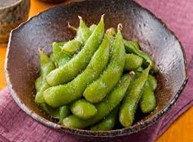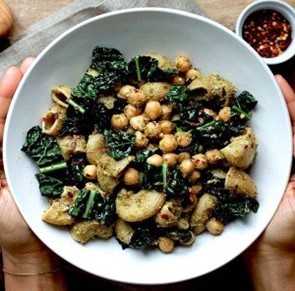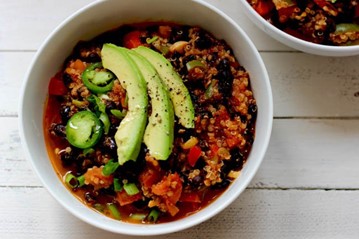What are plant-based proteins?
Plant-based proteins are proteins that come from plant sources rather than animal sources.
When utilizing plants as your main source of protein in a meal, variety is key! Mix and match different sources of plant-based proteins to get all the important nutrients your body needs.
Consuming more plant-based proteins does not mean that you need to cut out animal proteins all together! Try substituting in a plant-based protein for at least one of your meals.
Examples of plant-based proteins
- Soy products: tofu, tempeh, edamame, soy milk
- Lentils
- Beans: chickpeas (garbanzo beans), black beans
- Seitan: a meat substitute made from gluten, the main protein found in wheat
- Nuts: peanuts, almonds, nut butters
- Quinoa
- Seeds: chia seeds, hemp seeds
- Protein-rich veggies: broccoli, kale, mushrooms, potatoes, asparagus, Brussels sprouts
- Oats/oatmeal
- Whole grain breads
- To identify breads higher in protein, find the nutrition facts label & look for breads with 4 or more grams of protein per serving.
*Look for the vegetarian dishes on the Club Center on the menu!
Health benefits of plant-based proteins
- Eating more plant foods may be able to reduce the risk of chronic diseases such as type 2 diabetes, heart disease, and high blood pressure.
- Plant-based proteins are packed with important nutrients such as fiber, vitamins, and minerals.
Sustainable eating with plant-based proteins
- Reduce deforestation.
- Reduce greenhouse gas emissions—meat production is a large contributor to greenhouse gas emissions.
- Plants require less water, food, land, and energy for growing and transporting compared to livestock.
Recipes
Breakfast:
- Peanut butter oatmeal: https://www.tasteofhome.com/recipes/peanut-butter-oatmeal/
- For an extra boost of protein, try using soy milk instead of water!
Lunch and Dinner:
Additional Recipes
- Black Bean Veggie Burgers: https://foodheavenmadeeasy.com/spicy-black-bean-vegan-burgers/
- Mexican Vegetable Rice Bowl: https://foodheavenmadeeasy.com/mexican-vegetable-rice-bowl/
- Mediterranean Kale Salad: https://foodheavenmadeeasy.com/mediterranean-kale-salad/
- A good ole’ peanut butter and jelly sandwich
References
https://www.nutritionletter.tufts.edu/special-reports/the-power-of-plant-based-proteins
https://www.heart.org/en/healthy-living/healthy-eating/eat-smart/nutrition-basics/how-does-plant-forward-eating-benefit-your-health
https://www.medicalnewstoday.com/articles/321474#plant-vs-animal-protein
https://www.healthline.com/nutrition/protein-for-vegans-vegetarians#TOC_TITLE_HDR_19
https://www.hsph.harvard.edu/nutritionsource/2015/06/17/5-tips-for-sustainable-eating






